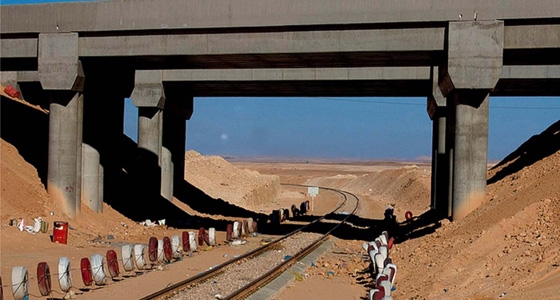The $7 billion railway project linking Riyadh with Jeddah gathered steam with the state-owned Public Investment Fund signing a SR270 ($72) million contract with Fluor, a US company, to provide management consultancy.
Fluor is contracted to oversee the work of the contractors and experimental operation of the railway project over a period of 84 months, according to the Saudi Press Agency.
The contract is part of the plan ordered by Custodian of the Two Holy Mosques King Abdullah to complete the railway infrastructure of the Kingdom and in line with a decision of the Council of Ministers to construct a railway line connecting the Kingdom's west coast with its east coast.
PIF will fund the massive project and a supporting team drawn from the ministries of Transport, Finance and Saudi Railways Company (SAR) was formed to supervise the project.
SAR Board Chairman Mansour Al-Maiman said the line would start from Jeddah Islamic Port to Riyadh to be connected with the existing 450 km line between Riyadh and Dammam, with a second 115-km new line planned to connect Dammam with Jubail on the Arabian Gulf.
The 958-km dual track railway passing through different geographical areas will necessitate construction of a series of tunnels and bridges. The SAR will closely work with Fluor for scheduling all construction work based on the highest quality and standards, he said.
The SAR is fully owned by the PIF and is currently implementing the North-South Railway (NSR) project. It is the world's largest railway construction and the longest route to adopt the European Train Control System (ETCS) to date. It is a 2,400-km passenger and freight rail line originating in the capital city Riyadh, in the northwest of the country, to Al Hudaitha, near the border with Jordan.
Al-Maiman, chairman of SAR, said Fluor was picked from five international companies that had offered their bids to win the contract. Fluor will work with Parsons Brinckerhoff to review the engineering designs.
The Saudi Landbridge Project is part of the Saudi Railways Organization's railway expansion program.
It will be the first rail link between the Red Sea and the Gulf.
Transport Minister Jabara Al-Seraisry said: "The land bridge along with the North-South Railway and the Haramain Railway will have a big impact on the social and economic development of the country."
The project is expected to have a significant impact on the transport potential of the country. It will allow freight of cargo imported from East Asian countries via King Abdul Aziz Port in Dammam, and from Europe and North America via Jeddah Islamic Port. This would result in more transit cargo and savings in regional freight economy.
With the construction of the Jeddah-Riyadh rail link, the time taken for passenger transport will be six hours instead of the current 10 to 12 hours by bus. For freight, trains the maximum travel time will be 12 hours.
The design speed of passenger trains is expected to be 250 kph and 140 kph for freight trains, making the trip between Dammam and Jeddah around 12 hours for cargo. Sea-borne freight can take up to nine days to travel between the two destinations.
Arab News
5 January






















































